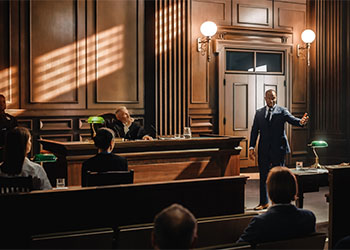What to Expect at Trial
June 12, 2024
 If you are facing criminal charges and the next step in your case is trial, the mere thought of going to court and defending yourself in front of the judge may be enough to cause a panic attack. Your palms get sweaty, your heart starts racing, and it may seem like you cannot breathe when you think about what might happen at your trial.
If you are facing criminal charges and the next step in your case is trial, the mere thought of going to court and defending yourself in front of the judge may be enough to cause a panic attack. Your palms get sweaty, your heart starts racing, and it may seem like you cannot breathe when you think about what might happen at your trial.
As criminal defense attorneys at Life Law, we have seen these signs of panic disappear in our clients the moment they entrust us with their defense. With offices in Nags Head and Raleigh, North Carolina, our detail-oriented attorneys can become your strong allies in fighting for the best possible outcome at your trial.
Your Rights at a Criminal Trial
A criminal case won’t end up at trial unless the defendant pleads “not guilty” at the arraignment, which is the defendant’s first court appearance. If you are awaiting your first appearance in court, you might want to learn more about what to expect at your arraignment and how you can prepare.
If your case goes to trial, the prosecution will have the burden of proving that you are guilty of the charges you are facing beyond a reasonable doubt. The presumption of innocence also applies here, so the judge and jury should presume you are innocent until the prosecution can prove otherwise.
As a defendant facing criminal charges, you have certain rights at your trial, including:
The right to a speedy and public trial
The right to due process
The right to confront the accuser
The right to trial by jury
The right to protection from self-incrimination
The right to legal counsel
If you have been charged with a crime and your case is headed to trial, you might want to hire a criminal defense attorney to represent you as early as possible. Ideally, you should contact an attorney even before authorities officially bring the charges. However, if you have already attended your arraignment and are preparing for trial, it’s still not too late to hire an attorney.
What Happens at Trial?
The criminal trial process follows a structured set of procedures:
Jury selection. As the name implies, this step involves the selection of the people who would serve on a jury during a trial if the defendant requested a jury trial instead of a bench trial (conducted by the judge alone). During this process, which involves asking prospective jurors a series of questions, jurors may be excused by the judge or either side (prosecution or defense) from serving in the trial based on their answers.
Opening statements. After the jurors are selected, the trial begins with the opening statements made by both sides. The prosecution will go first. In their opening statements, the parties will briefly outline their cases and legal issues. The sides are not supposed to argue their cases just yet as their opening statements serve as the “road map” for the judge and jury.
Presentation of evidence. The next stage requires each side to present their evidence. As with the opening statements, the prosecution goes first. The parties are expected to present physical and documentary evidence as well as the testimony of their witnesses. After each side presents their evidence, they are permitted to provide their rebuttal evidence concerning matters raised in the evidence presented by the opposing party and cross-examine their witnesses.
Closing statements. The trial culminates in closing statements provided by both sides. This is the last chance of both the prosecution and the defense to convince the jury to return a verdict in their favor.
Jury instructions. When both sides are finished with their closing arguments, the judge will instruct the jury about the law they will have to apply to what they have just heard. This allows them to arrive at their special verdict.
Jury deliberation. At this final stage of a trial, the jurors go to a private room where they “deliberate,” which is the legal term for making a decision and arriving at a special verdict. The verdict must be unanimous. The verdict is then presented to the judge who arrives at the final decision in the case and announces that decision to the prosecution and the defense.
There are two possible outcomes of a criminal trial: guilty or not guilty. If you are found guilty, you will be free to go. If you are found guilty, the judge will impose a sentence. Even if you get a guilty verdict, you should talk to your attorney about the possibility of filing an appeal.
Get Strong Legal Representation for Your Trial
If you are accused of a crime, speaking with an attorney will help you understand the legal process and prepare for what comes next.
Our criminal defense attorneys at Life Law have more than 15 years of experience representing clients at arraignments, trials, and other proceedings. We have the knowledge and experience in North Carolina’s criminal court system to guide you through each step and help you achieve a better and brighter future.
With offices in Raleigh and Nags Head, we also serve clients in Charlotte, Wilmington, and Asheville. Get in touch today to tell us more about your situation.
